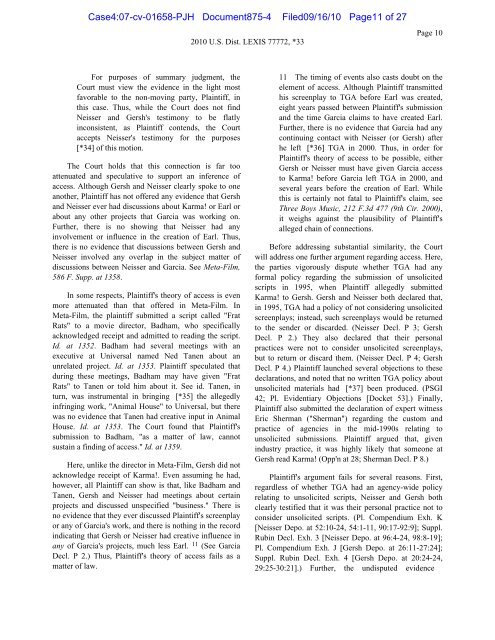exhibit 2 - SAP Lawsuit Portal
exhibit 2 - SAP Lawsuit Portal
exhibit 2 - SAP Lawsuit Portal
You also want an ePaper? Increase the reach of your titles
YUMPU automatically turns print PDFs into web optimized ePapers that Google loves.
Case4:07-cv-01658-PJH Document875-4 Filed09/16/10 Page11 of 27<br />
For purposes of summary judgment, the<br />
Court must view the evidence in the light most<br />
favorable to the non-moving party, Plaintiff, in<br />
this case. Thus, while the Court does not find<br />
Neisser and Gersh's testimony to be flatly<br />
inconsistent, as Plaintiff contends, the Court<br />
accepts Neisser's testimony for the purposes<br />
[*34] of this motion.<br />
The Court holds that this connection is far too<br />
attenuated and speculative to support an inference of<br />
access. Although Gersh and Neisser clearly spoke to one<br />
another, Plaintiff has not offered any evidence that Gersh<br />
and Neisser ever had discussions about Karma! or Earl or<br />
about any other projects that Garcia was working on.<br />
Further, there is no showing that Neisser had any<br />
involvement or influence in the creation of Earl. Thus,<br />
there is no evidence that discussions between Gersh and<br />
Neisser involved any overlap in the subject matter of<br />
discussions between Neisser and Garcia. See Meta-Film,<br />
586 F. Supp. at 1358.<br />
In some respects, Plaintiff's theory of access is even<br />
more attenuated than that offered in Meta-Film. In<br />
Meta-Film, the plaintiff submitted a script called "Frat<br />
Rats" to a movie director, Badham, who specifically<br />
acknowledged receipt and admitted to reading the script.<br />
Id. at 1352. Badham had several meetings with an<br />
executive at Universal named Ned Tanen about an<br />
unrelated project. Id. at 1353. Plaintiff speculated that<br />
during these meetings, Badham may have given "Frat<br />
Rats" to Tanen or told him about it. See id. Tanen, in<br />
turn, was instrumental in bringing [*35] the allegedly<br />
infringing work, "Animal House" to Universal, but there<br />
was no evidence that Tanen had creative input in Animal<br />
House. Id. at 1353. The Court found that Plaintiff's<br />
submission to Badham, "as a matter of law, cannot<br />
sustain a finding of access." Id. at 1359.<br />
Here, unlike the director in Meta-Film, Gersh did not<br />
acknowledge receipt of Karma!. Even assuming he had,<br />
however, all Plaintiff can show is that, like Badham and<br />
Tanen, Gersh and Neisser had meetings about certain<br />
projects and discussed unspecified "business." There is<br />
no evidence that they ever discussed Plaintiff's screenplay<br />
or any of Garcia's work, and there is nothing in the record<br />
indicating that Gersh or Neisser had creative influence in<br />
any of Garcia's projects, much less Earl. 11 (See Garcia<br />
Decl. P 2.) Thus, Plaintiff's theory of access fails as a<br />
matter of law.<br />
2010 U.S. Dist. LEXIS 77772, *33<br />
Page 10<br />
11 The timing of events also casts doubt on the<br />
element of access. Although Plaintiff transmitted<br />
his screenplay to TGA before Earl was created,<br />
eight years passed between Plaintiff's submission<br />
and the time Garcia claims to have created Earl.<br />
Further, there is no evidence that Garcia had any<br />
continuing contact with Neisser (or Gersh) after<br />
he left [*36] TGA in 2000. Thus, in order for<br />
Plaintiff's theory of access to be possible, either<br />
Gersh or Neisser must have given Garcia access<br />
to Karma! before Garcia left TGA in 2000, and<br />
several years before the creation of Earl. While<br />
this is certainly not fatal to Plaintiff's claim, see<br />
Three Boys Music, 212 F.3d 477 (9th Cir. 2000),<br />
it weighs against the plausibility of Plaintiff's<br />
alleged chain of connections.<br />
Before addressing substantial similarity, the Court<br />
will address one further argument regarding access. Here,<br />
the parties vigorously dispute whether TGA had any<br />
formal policy regarding the submission of unsolicited<br />
scripts in 1995, when Plaintiff allegedly submitted<br />
Karma! to Gersh. Gersh and Neisser both declared that,<br />
in 1995, TGA had a policy of not considering unsolicited<br />
screenplays; instead, such screenplays would be returned<br />
to the sender or discarded. (Neisser Decl. P 3; Gersh<br />
Decl. P 2.) They also declared that their personal<br />
practices were not to consider unsolicited screenplays,<br />
but to return or discard them. (Neisser Decl. P 4; Gersh<br />
Decl. P 4.) Plaintiff launched several objections to these<br />
declarations, and noted that no written TGA policy about<br />
unsolicited materials had [*37] been produced. (PSGI<br />
42; Pl. Evidentiary Objections [Docket 53].) Finally,<br />
Plaintiff also submitted the declaration of expert witness<br />
Eric Sherman ("Sherman") regarding the custom and<br />
practice of agencies in the mid-1990s relating to<br />
unsolicited submissions. Plaintiff argued that, given<br />
industry practice, it was highly likely that someone at<br />
Gersh read Karma! (Opp'n at 28; Sherman Decl. P 8.)<br />
Plaintiff's argument fails for several reasons. First,<br />
regardless of whether TGA had an agency-wide policy<br />
relating to unsolicited scripts, Neisser and Gersh both<br />
clearly testified that it was their personal practice not to<br />
consider unsolicited scripts. (Pl. Compendium Exh. K<br />
[Neisser Depo. at 52:10-24, 54:1-11, 90:17-92:9]; Suppl.<br />
Rubin Decl. Exh. 3 [Neisser Depo. at 96:4-24, 98:8-19];<br />
Pl. Compendium Exh. J [Gersh Depo. at 26:11-27:24];<br />
Suppl. Rubin Decl. Exh. 4 [Gersh Depo. at 20:24-24,<br />
29:25-30:21].) Further, the undisputed evidence


